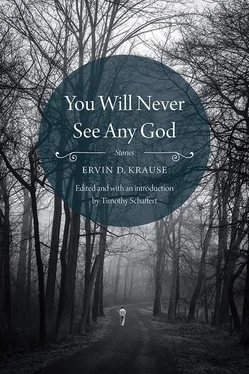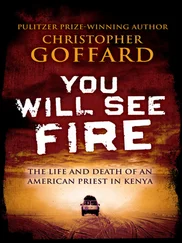“Shut up. Fool kid’s talk,” the mother said.
They moved in the barren spring. (The father could not keep a place.) The boys were used to it, were not troubled by the change in schools or the change in bedrooms; the beds were the same. They had an excitement in the discovery of this new place, wandered gladly across its hilly acres in search of the cows at evening, and came to the hill, to the weed-encrusted tumble fence with its old posts made of tree branches and its rusted wire. There at the hilltop they could see the house of the Widow O’Neill, this the reverse side, the dirt road far away now, the lane coming up, turning sharply, the ditches on either side, the gray chicken coop and one other shed, nothing else, no tree, nothing. The tractor of Nystrom buzzed in the field by the road.
Always watching in the marvelous fascination of a different thing, a hope of something mysterious and strange, they looked, turned, looked again, called to the cows, these mongrel cows, roans and brindles, all skinny and mean, headed them back to the place.
On their own side of the fence, there across the far hill in dull placidness they could see the old man and the slow horses barely move along the hillside, the plow leaving a narrow furrow, without sound. The cows clicked home in that spring dust, the fence jumpers wearing their halters of barbed-wire which nevertheless did not keep them in. The cows needed constant watching.
“Let’s go up and see the Widow’s house, what do you say?” Henry said. He was the heavier, the round-faced one.
Queasy feeling in his belly, a fear he did not like, made Herman, the slender one, avert his face. “All right,” he muttered, barely audible.
But milking came and supper and Henry made neither sound nor motion, as if he had forgotten it. Herman wondered why, and was glad they did not go.
It came somewhat later, unexpected.
They kicked up a badger one afternoon and chased the puffing thick creature down to the fence and under it, to its hole in the open field, almost catching up to it.
They scraped at the edge of the hole for a time, knowing it was purposeless. “We’ll tell Werner. He’ll trap him,” Henry said.
The excitement gone, Herman looked down then, down the hill to that quietness where the house stood, intruder in that arid space, the color of dry bark on this northern side where the winter winds could pummel it black, sharp and angular projection with neither tree nor shrub between it and the straight horizon.
“Come on, there’s nobody there now,” Henry said, still flushed from the rush after the badger.
The afternoon sun was hot (it was May), the oat field they walked on had turned pale, pale green if one looked obliquely and caught the shiver of leaves, but straight down were only the brown clouds.
They walked stiff-legged, carefully. It was easy to begin, Herman thought.
“If someone’s there we’ll say we’re after water,” Herman said, liking that slyness of thought.
“There’s nobody there, you can see that,” Henry said, but with a hesitation in his walk, almost a stumble, that made Herman go first.
They went past the chicken coop. One hen, four chicks scruffing in the dirt, the hen lifting feathers at them when they came too close. They saw the wood lean-to by the house and a cob shed.
“See, there’s nobody here,” murmured Henry. He went to the window, Herman following, to look in, and then suddenly, hideously, long, lean, dark, black from the doorway quickly noiselessly opened, the figure lifted, pale face, pale hair issuing from the darkness of the house and the darkness of the slender hard body, a ferocious gaggle in the throat, and they sucked in their breaths.
Terrible sound issuing although the words, he knew, were only, “What do you want?” They backed, they fell, rose, and turned and ran and behind them a sound like laughter, a cackle of hell after them, they ran. They ran.
Furtive later. They did not talk of it.

They went visiting at times in the evening, the walk up the narrow road to the hilltop to see·Nystrom, old grizzled farmer with big ears and a fat wife and two big-eared sons and two fat daughters. They talked, the women in the house, the men (and boys) outside. Nystrom had a tractor and owned his farm; the old man was obviously impressed, for Nystrom was so common a man, would talk to anyone, not high-toned at all.
“You do the work for the Widow?” the old man asked in the course of the conversation, out sitting on the wooden planking by the pump.
Herman came closer to them at that, listened carefully, pretending to work at the locust tree pod with his fingers.
Yes, Nystrom said, for a share of the crop.
“Funny for a woman to stay there all alone and not move to town.”
Guess she likes it that way, Nystrom said. She had talked of going back to Ireland. Had some relatives there, she said.
“Must be a funny one to always be alone in a shanty like that.”
Oh, they tell lots of stories about her, the queer things she does, Nystrom said with a nod of his big head. As for him, he saw her only once in a while, sometimes not for months, but she seemed all right to him. Her cousins came sometimes to see her, and the Liles took her to Martinsburg to buy things. She was always friendly to him. Too bad she was alone all the time, but it seemed that was the way she wanted it.
“I saw her once, when I was out getting cows,” Henry said suddenly, with bravery to speak out to his elders,” and she was real nice.”
Herman listened with a horror at his brother, that he should lie in his teeth like that, trying to pretend something he knew not to be true so that they, their elders, would listen to him and think him knowledgeable, and so that everyone would think he liked the woman. Herman was appalled and could not hide it, and did not try to hide it. There was some enormous deceit here that he could not abide; had his brother, twin brother, forgotten the terror of that afternoon moment, the blind and choking fear that had laid itself on their throats so that they could not speak of it, even to each other? How could he dispel so easily that awareness of a greater evil, so surely felt that terrible afternoon? Ah, he lied, he lied.
When they came to walk home, Henry tried to walk beside him but Herman punched him on the arm and they nearly had a fight, the mother accusing Herman of starting it, lunging for him to slap him, but he was too quick, and able in the openness of the space to dodge her.
“I’ll get you yet, you little devil,” the mother said. “You just wait. I hope he beats you up.”
He fell back, did not answer. Fear of the iron-handed parents held him. She hoped the twin would beat him up; that would be the day. He lagged behind, by himself scuffing in the dirt in the moonlit darkness.
From that time on he went alone, trailing the gaunt cows through the pasture, studying through the tumbleweed and burdock litter along the fence the gray house.
He saw her one day in the doorway. And she saw him. He did not move, thought it pointless to try to hide — he was on his own side of the fence — and she stood motionless far down there looking in his direction for a long time, fixed steady, as if casting spells. He was not afraid.
Nor was he afraid when the clouds built up in the early summer afternoons like a massive black brain of darkness, fissured, convoluted, and the heavens roiled, and the whirlwinds coiled like snakes across the patches of the Widow O’Neill. From the brush along the fences, he, unconcerned, almost, gathered blackberries and half-ripened plums where the worms had come and made them turn ripe too soon, an unnatural ripeness, the green side picked with holes, oozing bright juice, hardened and tight, and the other side turned purple-red where he nibbled delicately, with care. The storms did not frighten him, made him shiver a little at the way the clouds mounted powerful as the earth, the lightning snapped downward, tracing branches, stinging white against the black and hollow-looking clouds.
Читать дальше












